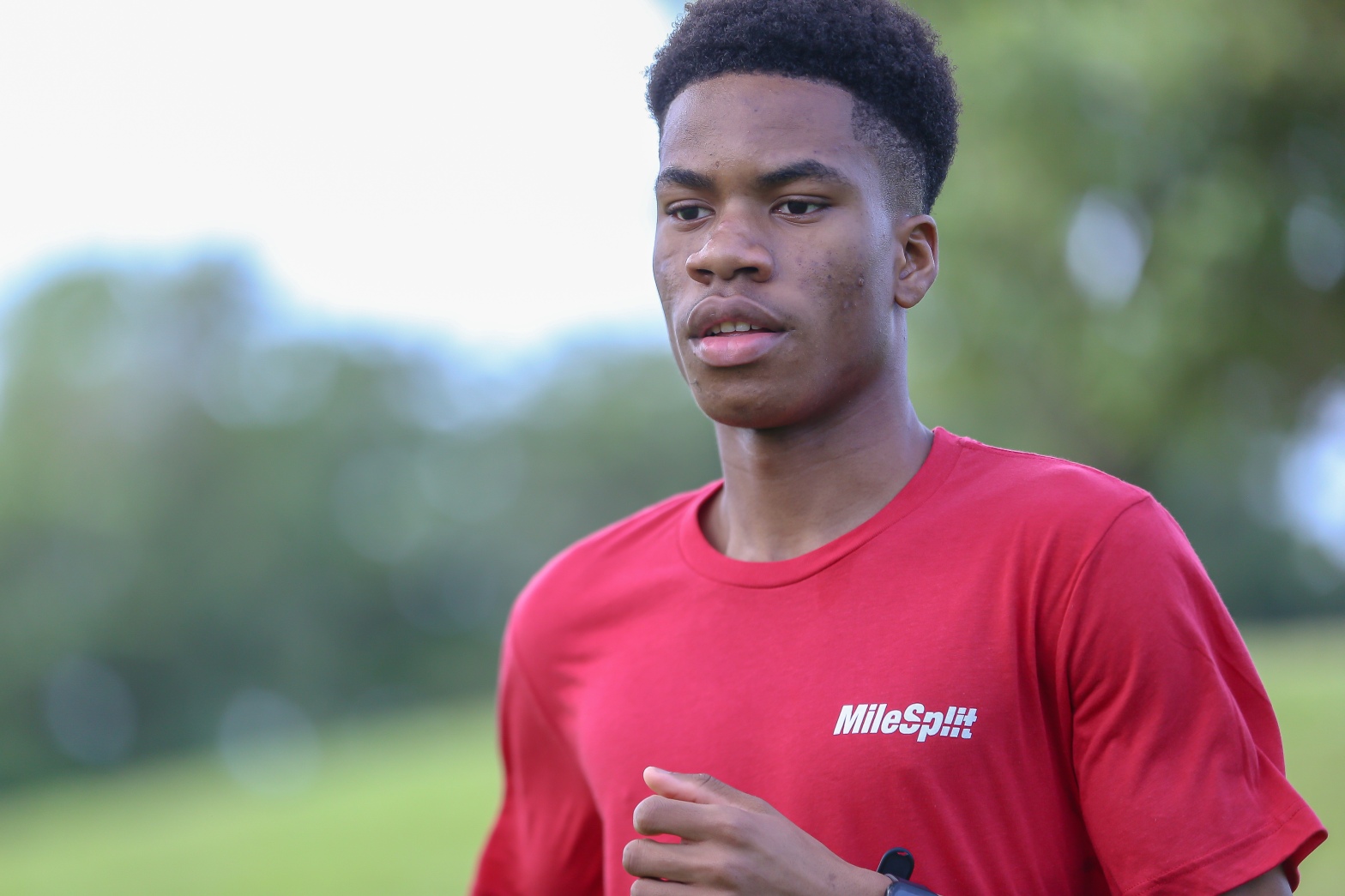By Joe Battaglia
Fidelis Osunwko III looked out the airplane window, staring at the expanses of open blue sky over the Atlantic Ocean, all he could think about was the opportunity that lay ahead.
Then his mind wandered.
To think, just two and a half years earlier he was on a plane from Nigeria, staring out the window at the horizon over the Atlantic thinking about how he would make the most of the new life that awaited him in the United States.
And here he was, a nascent runner, headed to the Bermuda XC Challenge, on a special invitation from three-time Olympian Hazel Clark, to compete on international soil for the first time.
“Two years ago, I was on a plane thinking about how my life was changing and how I was going to cope with everything,” Osunkwo said. “This week, I was also thinking about the opportunity, but it was how to represent my family, my state, my city, and my public school.
“I never could have imagined this. In a short time, I fell in love with running and it’s now taking me places. I got a stamp in my passport!”
Osunkwo also picked up a surprise victory in the Under-20 men’s race, covering the 5000-meter course at the Bermuda Botanical Gardens in 17:37.50, the second-fastest time of his career.
“Fidelis really warmed my heart,” Clark said. “I was so excited to meet him. For me he represents so much. He represents resilience. He represents the best of the sport and what this sport is about. Seeing his focus throughout the race. He would not quit. You could see he was on a mission.”
It’s just the latest triumph for the 17-year-old senior from Harry S. Truman High School in the Bronx, whose split-family upbringing in Africa and immigration experience has shaped him into a sophisticated, selfless, student-athlete that has become an inspiring leader for his family, his school and the Public School Athletic League.
“He’s one of one,” Desiree Moorer, Osunkwo’s coach and guidance counselor said.

African Origin
Nigeria is a Sub-Saharan country in West Africa, situated on the Gulf of Guinea and Atlantic Ocean. Historically, the country saw several periods of indigenous kingdoms before the tumult of Portuguese colonization in the 16th century, the rise of the Atlantic slave trade, and British colonization in the 19th and early 20th centuries.
After Nigeria gained full independence from the United Kingdom in 1960, it struggled through nearly three decades of republics marred by civil war and military dictatorship. When General Sani Abacha died in 1998 his successor, General Abdulsalami Abubakar, adopted a new constitution which provided multiparty elections and a return to democracy.
Today, Nigeria’s government models itself after the U.S. as a federation of 36 states, each run by elected governors, with a popularly elected president, permitted to serve two four-year terms, checked by an elected senate and house of representatives.
Osunkwo grew up in Imo State in the southeast area of the country. Imo is the third-smallest state in the country but 14th most populous, with an estimated 5.1 million residents according to 2019 census figures. Nicknamed the “Eastern Heartland,” Imo’s economy is highly dependent on agricultural production, particularly palm oil which is its top export.
“To be honest, I would say growing up in Nigeria was pretty hard,” he said. “I wasn’t living with my dad because he was over here helping us. Everything I did was with my mom and supporting all the stuff that was required. I had to take care of my older sister and my younger brother.”
Imo is also home to one of the most significant track and field athletes in modern history in Chioma Ajunwa, who won gold in the long jump at the 1996 Olympics in Atlanta, becoming the first Nigerian Olympic champion and the first black African woman to win an Olympic gold medal in a field event.
And while Nigeria may boast the largest economy on the African continent, it is still largely a lower-middle-income economy with the second-largest source of foreign exchange earnings coming from remittances sent home by family members living and working abroad.
Such was the case for Osunkwo’s family. His father, Fidelis Jr., lived in the U.S. working a job in law enforcement and sent money back home to support his wife and children. His mother, Grace, operated her own trading business, acquiring food from outside sources for resale.
As the oldest son, Osunkwo learned at a young age to take responsibilities most of his American contemporaries never had to.
“To be honest, I would say growing up in Nigeria was pretty hard,” he said. “I wasn’t living with my dad because he was over here helping us. Everything I did was with my mom and supporting all the stuff that was required. I had to take care of my older sister and my younger brother.”
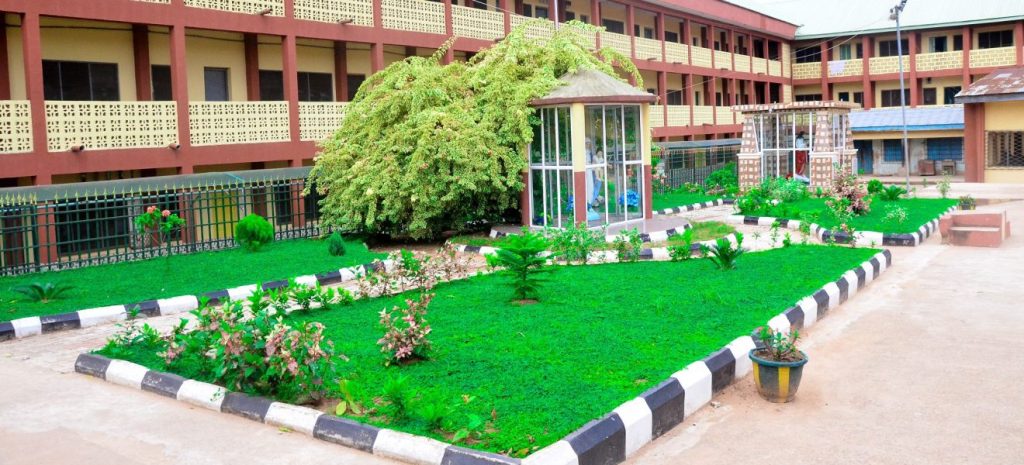
An Education Abroad
In 2015, at the age of 10, Osunkwo and his sister, Herietta, were sent to Marist Brothers Juniorate, a boarding school in Uturu, about 90 minutes from Imo in Abia State, to both further their educations but also to relieve some of the responsibility at home with only their younger brother, Michael, for Grace to care for.
“Life in a Catholic boarding school was very difficult,” Osunkwo said. “I had to wake up at 5 a.m. to go to morning mass. Then we would come back to the dormitory and do morning function, which was compulsory or else you would get punishment. Then we would go for morning breakfast, and then go to class.
“After classes, we went to the auditorium to pray and then went to lunch, then back to our dormitory for afternoon siesta. After that we would go to afternoon prep and then our extracurricular activities. When that was over, we would go back to the dormitory for showers and then back to the auditorium to pray again. After prayers, we’d go to dinner and then night prep to study again, and then more prayers.”
His five years spent at boarding school and away from his mom helped Osunkwo develop a strong sense of independence and maturity.
“I had to live by myself, take care of myself, wash clothes myself,” he said. “I had to do all that stuff by myself, do homework by myself, study by myself, take exams by myself. It taught me a parent doesn’t have to be there for me to know what is right for me.”
The regimented nature of the school curriculum also taught him the structure and discipline that would not only shape his foundational leadership tendencies but would become the building blocks for his future life in America.

Coming To America
By 2020, the family had saved enough money to reunite and began preparing to join Fidelis Jr. in New York. But due to the global COVID-19 pandemic, Grace’s immigration paperwork got delayed. So as to not allow the kids’ paperwork to expire, they made the difficult decision for Osunkwo, Herietta and Michael to join their father while Grace remained behind in Nigeria.
Osunkwo said that emotionally enduring another even-longer-distance separation from his mother was difficult. Growing up he had naturally grown extremely close to his mother in what was essentially a single-parent home while his father was living and working overseas.
“There was one time when I was young – I think I was 7 – and I was sleeping and my mom left the house to go get something,” Osunkwo recalled. “I woke up and was surprised that no one was home. I went to the balcony to see if I was going to see my mom and my siblings downstairs playing. When I didn’t see any of them, I put my head out through the balcony and fell off the balcony and got hurt pretty bad.”
The move also represented a shift in parenting difficulty from Grace to Fidelis Jr., who was now faced with the challenge of balancing work with supporting the transition to a new life in a new country for his teenage kids.
“I know from speaking with him that it was tough for Fidelis’ father,” Moorer said. “These are teenagers making an enormous move and change around that time when they’re trying to figure out who they are, what they want to do, the kind of person they want to be. I have a teenager at home and dealing with teenagers every day, I see transitions and I can see how it can be tough for a single dad trying to make sure everything is good at home.”
Osunkwo was determined to take some of that responsibility off his father’s shoulders.
“If I didn’t do my part, everything my father did was going to be for waste,” Osunkwo said. “I had to pay him back with respect and support him in everything he had given for me and my family.”
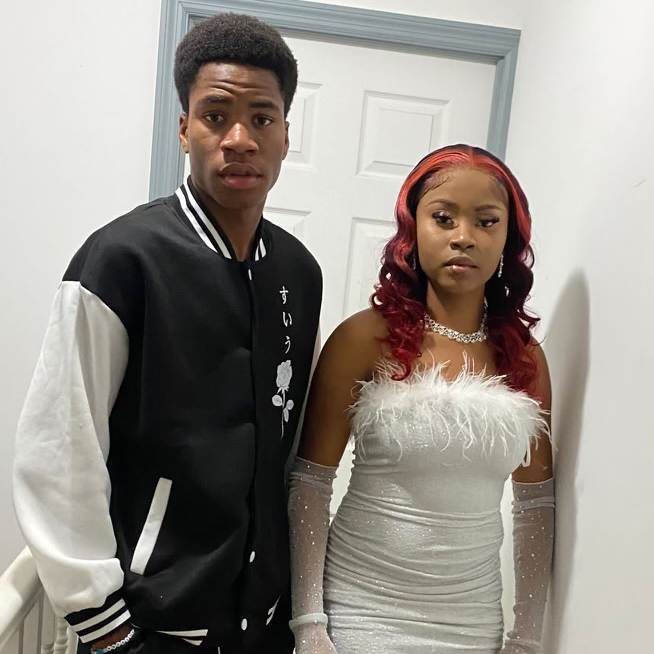
Family Matters
Education has always been a priority for the family so making the transition from Catholic boarding school in Uturu to public high school in New York figured to be the biggest challenge.
Osunkwo was confident in his English, but would people be able to cut through his thick Nigerian accent and understand him?
What he never accounted for was beginning school during heightened COVID-19 protocols.
“I remember the first day of school there was this long line to get in and I didn’t know what was happening,” Osunkwo recalled. “They were telling us to scan in on an iPhone app to see if you had COVID. I was like, ‘Scan what? With what?’”
“It was a culture shock,” Moorer added. “But the way he adapted was as if it was nothing. You look at him in 10th grade versus now and it’s like the same work ethic, but two different people.”
Osunkwo’s boarding school experience had ingrained in him the differences between right and wrong so making good choices was already second nature. That enabled him to zero in on he and his siblings achieving at the highest level academically.
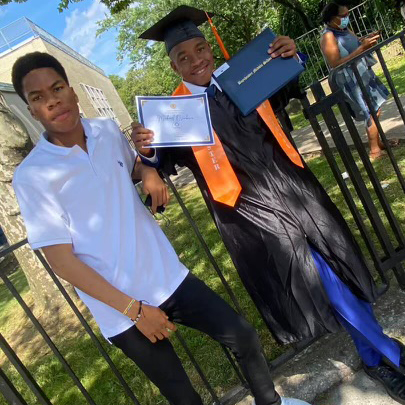
And that went beyond his own studies. He was also incredibly protective of Herietta. Even though she was the eldest of the three, Osunkwo went out of his way to make sure she was taking the right classes and keeping her grades up. She graduated From Truman last spring in the top half of her class and is now attending New England College in New Hampshire, where she is pursuing a degree in nursing.
“What I do here is I will call each student in and sit down with them and say, ‘Hey, this is your report card. How do you feel about it?’” Moorer explained. “Every time I did, Fidelis would also say, ‘Oh, Ms. Moorer, can you please send me my sisters’? I was like, ‘This is not your report card. She did well. Trust me. I’ll send it to your dad.’
“Even the college process for her. He was helping her, even though he was younger as a junior, because he wanted to make sure that everything was well. He always looked to make sure that his dad didn’t have to second-guess anything. His dad was very involved and would call and text me to make sure the kids were great, but with Fidelis it was like having another parent over his sister. He wouldn’t feel right with himself if he didn’t feel like his sister was okay”
Osunkwo said he was only fulfilling his cultural responsibilities.
“In my family, as the first son, it’s the traditional thing to have the right to take care of other siblings,” Osunkwo said. “That’s the job. That’s the reason why I have to step up and make things right in my family.”
A Running Start
Maximizing his own high school experience never took a back seat. Osunkwo had a key understanding of the value of extracurricular activities on a college application from day one, so getting involved in sports at Truman was always in his plan.
In his years at Marist Brothers Juniorate, Osunkwo played soccer so that was his first choice. But when he didn’t make the team at Truman, he needed another sport to pursue. A friend of his from back home, Chimaji Okafor, was captain of the Truman track team so that made for a natural Plan B.
But he quickly learned he was not a natural.
“To be honest, I was bad at everything,” Osunkwo said.
“I had this conversation at the time where I don’t want to say anything negative toward the kid, but in my head I was like, ‘Whoa, we have a lot of work to do with him,” Moorer said. “But I saw his grit. He was motivated and wanted to learn, and had drive.
“I remember asking him, ‘Fidelis, what do you want to run?’ I honestly thought he was going to say the 100m because everybody swears they’re a sprinter. He said, ‘I want to run the 800m.’ I said, ‘For real? Okay.’ On his first day, he ran a 2:42. I said, ‘Give me a few months. I’ll guarantee you you’re going to make it in the 800m.’”
Moorer’s instincts were correct.
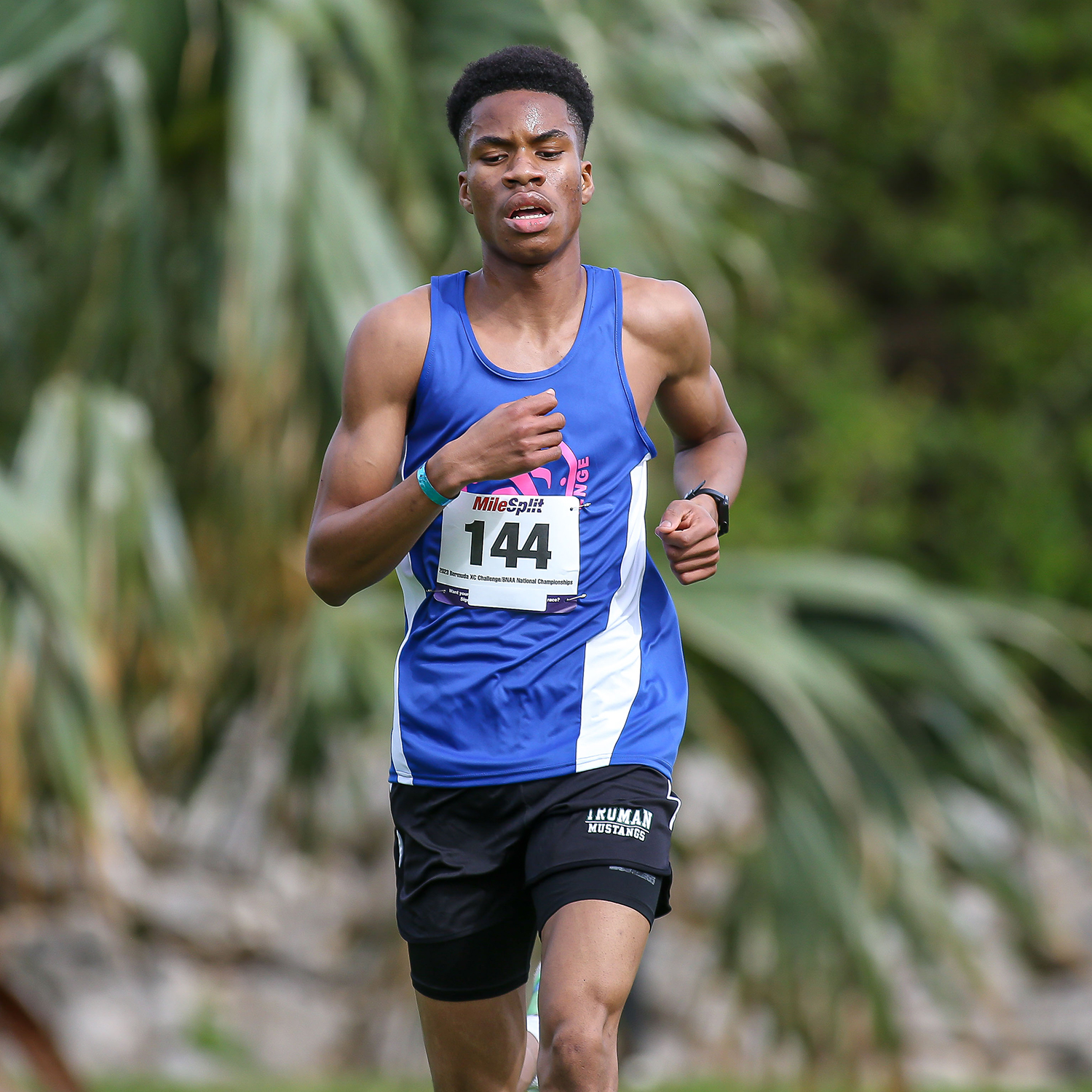

Osunkwo’s improvement over the 2022 outdoor track season was dramatic. On May 15, he cut his PR from that initial time trial to 2:06.43 in a third-place finish at the PSAL Bronx Borough Championships. Two weeks later, he finished 10th at the PSAL City Championships in 2:05.78.
He continued to improve on the summer club circuit, running 2:04.00 in a fourth-place finish at the AAU Region 1 Qualifier and then finished second at the USATF Outdoor Youth National Championships in 2:01.00.
Osunkwo has only gotten better from there.
Last fall, he won the PSAL City Championship in cross country, running 18:29.12 for 5K at Van Cortlandt Park. During the 2023 indoor track season, he won the PSAL City Championship in the 600m in 1:22.95, ran 2:43.84 in the 1000m at the PSAL Holiday Classic and won the PSAL Bronx Borough Championship in the 1000m in 2:46.41.
Outdoors, he won the PSAL Bronx Borough Championship in the 800m before going on to finish second at the PSAL City Championship in 1:56.80. This cross-country season, he shaved almost a full minute off his 5K PR at Van Cortland, running 17:30.10 to finish second at the PSAL Bronx Borough Championship before coming back two weeks later to win the “individual” race at the PSAL City Championships in 17:40.00.
“Consistently, I was coming to practice and saw my improvement and I fell in love with the sport of track and field,” Osunkwo said. “I feel like in this sport you are going to get out of it what you put into it. If you work hard, you’re definitely going to get good outcomes.”

Natural Born Leader
It came as no surprise to Moorer that after Okafor graduated, Osunkwo organically slid right into the team captaincy role.
“When he got here, we ws this little flower and then he became a whole bouquet,” Moorer said. “Here in school, he’s so humble even when everybody knows him. A number of kids look up to him, even captains of other teams, because he makes sure he does everything with the team and if the team is not getting it right, he makes sure that they know it.”
But it’s not just the student body that has gravitated to Osunkwo’s positivity and beyond-his-years ownership values. According to Moorer, the teachers at Harry S. Truman literally fight to get Osunkwo, who ranks 39th in his class of over 300 students – his rank would be higher had he chosen to accept COVID testing wavers – in their classes each semester.
“In terms of the true definition of student-athlete, he sets the bar right now,” Moorer said. “Because I do the programming for his classes, what’s amazing is that I have to let a lot of AP and Honors teachers tell them no sometimes because they all want him as a student. I have to say, ‘Listen, there are no more periods in the day.’”
As he looks to the future, Osunkwo is determined to use running as an avenue to continue his education and his desire to serve a greater good.
According to Moorer, he has gotten college interest from College of Staten Island, Holy Family, St. Thomas and Buffalo. Osunkwo’s first choice, however, is UConn, which would enable him to pursue a degree in pharmacy, continue running, and remain relatively close to home.
“I want to pursue pharmacy because I want to help people on the professional side,” Osunkow said. “Pharmacy has a communication background where you have to communicate with people about their medication. I want to pursue my education. I want to keep running.
“I’m positive that I can continue to do good.”
